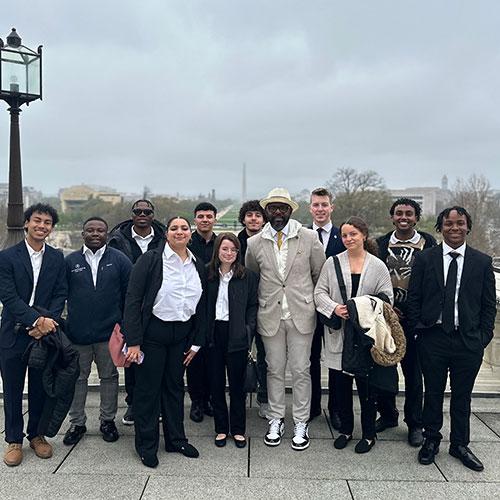Internship Guidelines for Employers
Career Development has provided the information below to offer some guidelines for internship criteria:
“An internship is a form of experiential learning that integrates knowledge and theory learned in the classroom with practical application and skills development in a professional setting. Internships give students the opportunity to gain valuable applied experience and make connections in professional fields they are considering for career paths, and give employers the opportunity to guide and evaluate talent.”
According to NACE (National Association of Colleges & Employers), to ensure that an experience is educational and therefore eligible to be considered a legitimate internship by the above definition, all of the following criteria must be met:
- The experience must be an extension of the classroom: a learning experience that provides for applying the knowledge gained in the classroom. It must not be simply to advance the operations of the employer or be the work that a regular employee would routinely perform.
- The skills or knowledge learned must be transferable to other employment settings.
- The experience has a defined beginning and end, and a job description with desired qualifications.
- There are clearly defined learning objectives/goals related to the professional goals of the student’s academic coursework.
- There is supervision by a professional with expertise and educational and/or professional background in the field of the experience.
- There is routine feedback by the experienced supervisor.
- There are resources, equipment, and facilities provided by the host employer that support learning objectives/goals.
Internship Types
- A paid internship is a position that is professional in nature, with a salary and work hours negotiated between the student and employer.
- Credit internships must offer an educational experience for the student and must be approved by the appropriate academic department.
Occasionally, employers contact Career Development with questions such as:
- Are students available for internship positions during the summer only? Or could we potentially have someone in place during the Spring or Fall semester?
- How many hours can a student work per week on an internship basis?
- Is it common to offer payment/stipend to the intern, or are these traditionally unpaid assignments?
- As the hiring company, what are the expectations for us? Do we need to complete any forms, evaluations or other documents for the intern?
Something to keep in mind is that some academic departments require their students to complete an internship for academic credit (Criminal Justice, Social Work, and Mass Communication for example). For other academic departments, internships can be completed on an elective basis (Marketing, Finance, Information Systems to name a few). If students wish to receive academic credit, they have to consult with their respective academic departments as there are certain guidelines that have to be followed. It is recommended that the employer provides documentation stating the discussed details by way of a job description:
- Number of hours student will work per week
- Duties/responsibilities to be completed
- A specific type of student you are looking for (i.e. Specific major/course of study such as Psychology or Marketing with a minimum GPA of 3.5)
Toward the end of the internship, employers are sometimes required to provide an evaluation in order for students to receive academic credit.
If students wish to complete an internship on their own accord, payment is up to the employer. Some companies that recruit Iona students offer an hourly salary or a stipend, largely depending on the industry and the scope of responsibility.
Students can complete internship positions at times other than the summer. Fall semester internships typically last from September to December, and Spring semester opportunities typically last from January to May. Generally, students sometimes have more availability during the summer if they are not taking classes (for example, 30-40 hours per week), and may work fewer hours during the fall and spring semesters (for example, 10-25 hours per week) in conjunction with their class schedule.
Federal Guidelines for Unpaid Internships
U.S. Department of Labor Criteria
As interpreted by NACE, the internship site must also comply with the U.S. Department of Labor’s six criteria for establishing unpaid internships:
- The internship, even though it includes actual operation of the employer’s facilities, is similar to training that would be given in a vocational school.
- The internship experience is for the benefit of the student.
- The intern does not displace regular employees but works under the close observation of a regular employee.
- The employer provides the training and derives no immediate advantage from the activities of the intern. Occasionally, the operations may actually be impeded.
- The intern is not necessarily entitled to a job at the conclusion of the internship.
- The employer and the intern understand that the intern is not entitled to wages for the time in the internship.*
*Although it is understood that interns are not “entitled” to wages during an unpaid internship, at the discretion of the organization, alternative perks may be offered such as travel reimbursement, lunch, or participation in conferences and special events, if appropriate.
Source: National Association of Colleges & Employers (NACE) & the US Department of Labor


